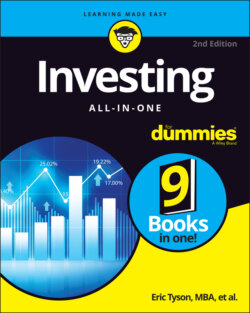Читать книгу Investing All-in-One For Dummies - Eric Tyson - Страница 95
Assessing student loans
ОглавлениеIf you’re one of many young adults with lingering student loan debt, you’re probably wondering whether you should focus your efforts on paying down that debt or instead invest the extra cash you have.
The best choice hinges on the interest rate on this debt (after factoring in any tax breaks) and how that compares with the expected return from investing. Of course, you must be reasonable and not pie-in-the-sky about the rate of return you expect from your investments.
Under current tax laws, with student loans, you can deduct up to $2,500 in student loan interest annually on your federal 1040 income tax return. So this deduction can lower the effective interest rate you’re paying on your student loans. This deduction is available to single taxpayers with adjusted gross incomes (before subtracting the student loan interest) of $70,000 or less and married couples filing jointly with such incomes of $140,000 or less. Partial deductions are allowed for incomes up to $85,000 for singles and $170,000 for married couples filing jointly. Another requirement for taking this deduction is that you and your spouse, if filing jointly, cannot be claimed as dependents on someone else’s income tax return.
If you can deduct student loan interest on your tax return, to determine the value of that deduction, see Chapter 2 in Book 2 to understand what tax bracket you’re in (what your marginal tax rate is). For most moderate income earners, 25 percent is a reasonable number to work with.
Suppose you have student loans outstanding at the attractive interest rate of just 3.5 percent. Assume that you’re able to deduct all this interest and that your income tax bracket is 25 percent. So, after taxes, the effective interest rate on your student loan is 3.5 percent – (0.25 × 3.5 percent) = 2.63 percent.
Now, the question to consider is this: Can you reasonably expect to earn an average annual rate of return from your investments of more than this 2.63 percent? If you invest your money in a sleepy bank account, the answer will surely be no. If you instead invest in things like stocks and bonds, over the long term, you should come out with a higher return.
If you have student loans at a higher interest rate — say, 6 percent — it may make more sense to pay those loans down faster with your extra cash than to invest that money elsewhere. To get a higher return than that from investments, you need to take a fair amount of risk, and of course there’s no guarantee that you’ll actually make a high enough return to make it worth your while.
When deciding whether you should pay down student loans faster, there are some factors to consider besides the cost of your student loans and comparing this cost to the expected return on your investments. Other good reasons not to pay off your student loans any quicker than necessary include the following:
Paying off your student loan faster has no tax benefit. Instead, you could contribute to your retirement (also known as tax reduction) accounts, such as a 401(k), an IRA, or a SEP-IRA plan (especially if your employer offers matching money). Putting additional money in a retirement plan can immediately reduce your federal and state income tax bills. The more years you have until retirement, the greater the benefit you receive if you invest in your retirement accounts. Thanks to the compounding of your retirement account investments without the drain of taxes, you can actually earn a lower rate of return on your investments than you pay on your student loans and still come out ahead.
You’re willing to invest in growth-oriented investments, such as stocks and real estate. To have a reasonable chance of earning more on your investments than it costs you to borrow on your student loans, you must be aggressive with your investments. Stocks and real estate have produced annual average rates of return of about 9 percent. You may be able to earn even more in your own small business or by investing in others’ businesses. Keep in mind that you have no guarantee, especially in the short term, of earning high returns from growth-type investments, which can easily drop 20 percent or more in value over a year or two.
Paying down your student loans depletes your emergency reserves. Psychologically, some people feel uncomfortable paying off debt more quickly if it diminishes their savings and investments. You probably don’t want to pay down your debt if doing so depletes your financial safety cushion. Make sure you have access — through a money market fund or other sources (a family member, for example) — to at least three months’ worth of living expenses (see the earlier section “Establishing an emergency reserve”).
